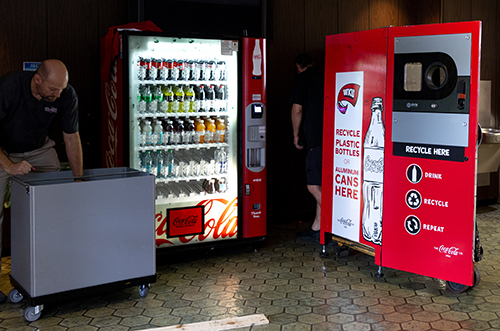WKU News
Reverse vending machines new addition to WKU's recycling efforts
- WKU News
- Thursday, October 24th, 2024

The newest addition to the vending machines in Cherry Hall doesn’t take cash, coins or cards. Instead, it takes aluminum cans and plastic bottles.
The reverse vending machine at Cherry Hall is one of four installed at Western Kentucky University by ATLAS RVM Systems and Clark Beverage Group.
“We are proud to be the first university in Kentucky to partner with our beverage bottlers and distributors to ‘close the loop’ and recycle near the same point of sale,” said Dr. Leslie North, WKU’s Director of Sustainability.
RVMs (reverse vending machines) are a unique way to effectively recycle campus waste that would otherwise end up in landfill. Users place their empty bottle or can into the entrance chute which is taken to the back of the machine, crushed and separated. (More: Watch a video from WKU Healthy Days 2024)
The RVM’s interactive screen guides the user through the process and opens a plethora of incentivizing possibilities from competing for the highest recycling rates to charity donations.
Two reverse vending machines were installed this spring at the Innovation Campus break room and outside the Preston Health and Activities Center entrance. Two more were installed in September at Cherry Hall and Grise Hall.
Renee Bedford, Director of Sustainability at Atlas RVM Systems, added: “We are thrilled to be working together with Clark Beverage Group and WKU to help to highlight the importance of recycling for the protection of the planet. The machines mean that more individuals play their part by acting sustainably and the fun and interactivity of the machines helps to connect communities. The RVMs act as a catalyst for change and we are proud to be working with organizations that want to genuinely make a difference and mitigate the impact on the planet’s finite resources.”
“The machines are part of Coca-Cola’s sustainability program to capture their plastics and aluminum and put it back in the recycling stream instead of going to landfills,” said Dr. Jennifer Tougas, Assistant Vice President Business Services.
The project fits in with WKU’s efforts to divert waste from landfills and reduce the amount of money spent on solid waste removal. The machines have an environmental and financial impact. “Every bottle that doesn’t end up in the trash can saves us money,” Dr. Tougas said.
Dr. North agreed. “As supplies of raw materials continue to diminish and waste management facilities continue to become increasingly strained, the importance of recycling grows greater and greater,” she said. “Partnerships between producers and users in systems are critical to maximize the benefits of sustainability related programs, such as recycling and other waste reduction measures. Through this partnership we have not only established additional recycling points for our campus community, but we are now also able to better incentive recycling efforts on campus and reduce contamination in our recycling stream. With time, we are hopeful the sorting mechanism built into the devices will also allow us to recycle aluminum locally, promoting an infinitely recyclable loop of that material.”
Contact: Jennifer Tougas, (270) 745-3931
-WKU-
Western Kentucky University prides itself on positioning its students, faculty and staff for long term success. As a student-centered, applied research university, WKU helps students expand on classroom learning by integrating education with real-world applications in the communities we serve. Our hilltop campus is located in Bowling Green, Kentucky, which was recently named by Reader’s Digest as one of the nicest towns in America, just an hour’s drive from Nashville, Tennessee.

